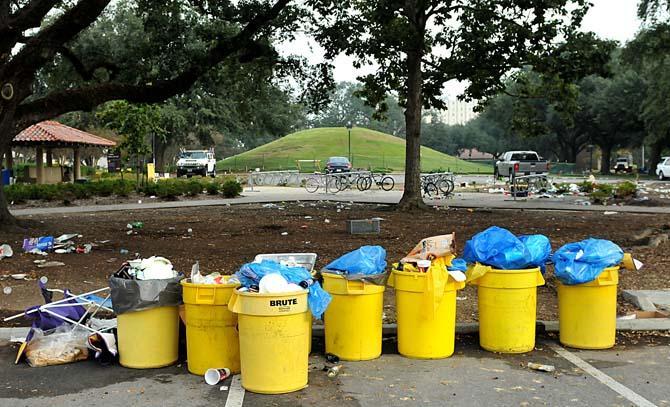The first light of the morning peeks through my blinds on a crisp fall Saturday. I rise from bed and stretch my muscles as I take my first big breath of the day. I walk over to my window and open the blinds to allow the warm sunlight to saturate my room. My eyes adjust and my body is awake.
I pull on some pants and shuffle to the kitchen. I make myself a bowl of cereal and head to sit in my favorite spot, the recliner in front of the biggest window in the apartment. I sink into the chair and look upon the street, thankful for the peace of the morning and the calm that will
continue throughout the day.
The world I live in is free of college football.
Purple and gold are worn to represent the university rather than the football team. The streets around LSU are quiet and clean, even on Saturdays. On Fridays, the student commuter lots are free to be parked in after 5 p.m. There is no risk of being towed due to the lots being reserved for RVs and out-of-town tailgaters.
Between bites of my cereal, I remember what life was like growing up in a city where the streets would clog on Friday nights and Saturday mornings and how part of the town would essentially shut down for the popular sport.
I remember riding my bike through the crowds of drunk tailgaters on the way to my old job in the stadium. I treated those biking commutes as a bonus round in a video game, pedaling through a sea of purple and gold attire, dodging beer cans littering the streets and making sure to avoid the gazes of confused onlookers at my lack of festive colored clothing.
My job consisted of serving food to the rich and powerful people of Baton Rouge. I think back on the hundreds of bowls of subpar gumbo I served, wondering how many thousands of dollars the people paid for me and my co-workers to serve them in the air-conditioned suites of the grand structure that was Tiger Stadium, now called the Old Stadium.
Since the demise of college football, Death Valley stands as a tomb to the memories that were made in it over the years. In the same way the Greek Theater is free for any wandering student to sit in or study or sleep, the stadium is now open to the public at any time.
The grass on the field is cut weekly, but there are no longer any white lines to mark the zones of the playing field. The tiger eye has long since faded into nonexistence.
The suites and stadium club where I worked in my youth have since been transformed into classrooms. Teachers and students can frequently be spotted enjoying the weather in the Old Stadium on any given day, and students use the open grassy area for throwing Frisbees, picnics and lounging.
Since football has ceased to be a part of our city’s culture, the draw for outsiders to come visit Baton Rouge has diminished. The feel of the city is calmer, more relaxed. Students now decide to make LSU their school not because there’s a football team but because they like the campus or they’re interested in a certain academic program.
Although the city was in a state of mourning for a time after football was extinguished from the school, people eventually came to see the beauty of a life without football.
The culture of binge drinking while watching huge men throw around a pigskin suddenly didn’t make sense, and the city was able to move forward.
As I finish my bowl of cereal, my mind snaps back to the present. In reality, football exists and is deep-rooted into the culture of Baton Rouge.
But on away game weekends like this one, I imagine myself living in a world where it’s a thing of the past.
Opinion: Imagine Baton Rouge in a life void of LSU football
By Mariel Gates
October 3, 2013
Gameday trash litters campus Sunday, Oct. 14, 2012 after LSU played South Carolina in Tiger Stadium.





